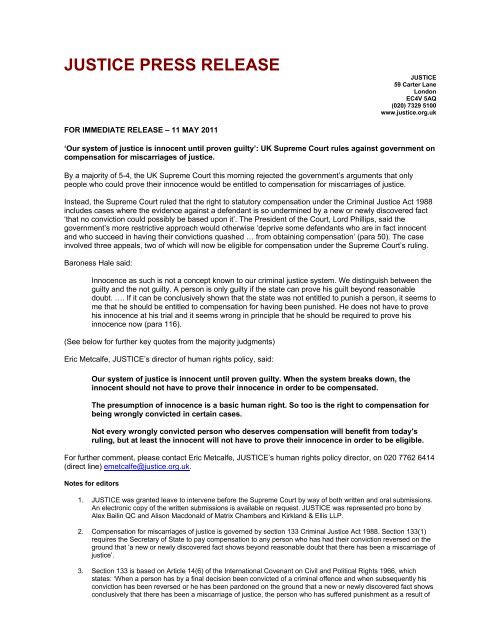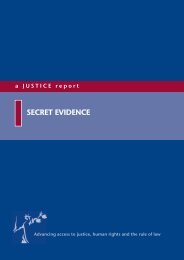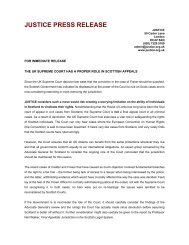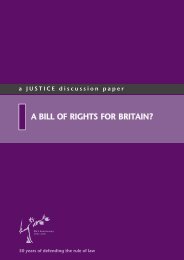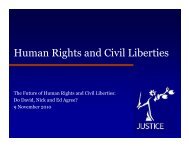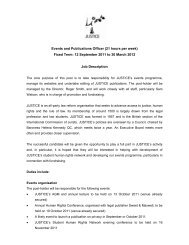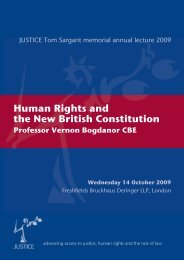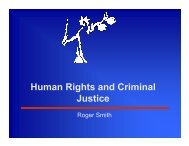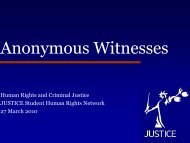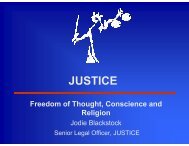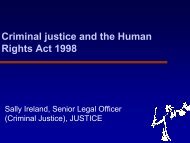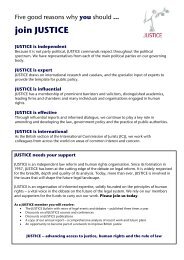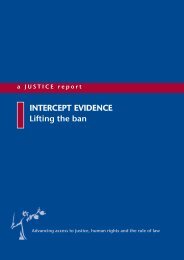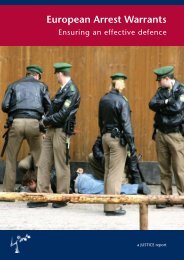JUSTICE press release - 11 May 2011
JUSTICE press release - 11 May 2011
JUSTICE press release - 11 May 2011
Create successful ePaper yourself
Turn your PDF publications into a flip-book with our unique Google optimized e-Paper software.
<strong>JUSTICE</strong> PRESS RELEASE<br />
<strong>JUSTICE</strong><br />
59 Carter Lane<br />
London<br />
EC4V 5AQ<br />
(020) 7329 5100<br />
www.justice.org.uk<br />
FOR IMMEDIATE RELEASE – <strong>11</strong> MAY 20<strong>11</strong><br />
‘Our system of justice is innocent until proven guilty’: UK Supreme Court rules against government on<br />
compensation for miscarriages of justice.<br />
By a majority of 5-4, the UK Supreme Court this morning rejected the government’s arguments that only<br />
people who could prove their innocence would be entitled to compensation for miscarriages of justice.<br />
Instead, the Supreme Court ruled that the right to statutory compensation under the Criminal Justice Act 1988<br />
includes cases where the evidence against a defendant is so undermined by a new or newly discovered fact<br />
‘that no conviction could possibly be based upon it’. The President of the Court, Lord Phillips, said the<br />
government’s more restrictive approach would otherwise ‘deprive some defendants who are in fact innocent<br />
and who succeed in having their convictions quashed … from obtaining compensation’ (para 50). The case<br />
involved three appeals, two of which will now be eligible for compensation under the Supreme Court’s ruling.<br />
Baroness Hale said:<br />
Innocence as such is not a concept known to our criminal justice system. We distinguish between the<br />
guilty and the not guilty. A person is only guilty if the state can prove his guilt beyond reasonable<br />
doubt. …. If it can be conclusively shown that the state was not entitled to punish a person, it seems to<br />
me that he should be entitled to compensation for having been punished. He does not have to prove<br />
his innocence at his trial and it seems wrong in principle that he should be required to prove his<br />
innocence now (para <strong>11</strong>6).<br />
(See below for further key quotes from the majority judgments)<br />
Eric Metcalfe, <strong>JUSTICE</strong>’s director of human rights policy, said:<br />
Our system of justice is innocent until proven guilty. When the system breaks down, the<br />
innocent should not have to prove their innocence in order to be compensated.<br />
The presumption of innocence is a basic human right. So too is the right to compensation for<br />
being wrongly convicted in certain cases.<br />
Not every wrongly convicted person who deserves compensation will benefit from today's<br />
ruling, but at least the innocent will not have to prove their innocence in order to be eligible.<br />
For further comment, please contact Eric Metcalfe, <strong>JUSTICE</strong>’s human rights policy director, on 020 7762 6414<br />
(direct line) emetcalfe@justice.org.uk.<br />
Notes for editors<br />
1. <strong>JUSTICE</strong> was granted leave to intervene before the Supreme Court by way of both written and oral submissions.<br />
An electronic copy of the written submissions is available on request. <strong>JUSTICE</strong> was represented pro bono by<br />
Alex Bailin QC and Alison Macdonald of Matrix Chambers and Kirkland & Ellis LLP.<br />
2. Compensation for miscarriages of justice is governed by section 133 Criminal Justice Act 1988. Section 133(1)<br />
requires the Secretary of State to pay compensation to any person who has had their conviction reversed on the<br />
ground that ‘a new or newly discovered fact shows beyond reasonable doubt that there has been a miscarriage of<br />
justice’.<br />
3. Section 133 is based on Article 14(6) of the International Covenant on Civil and Political Rights 1966, which<br />
states: ‘When a person has by a final decision been convicted of a criminal offence and when subsequently his<br />
conviction has been reversed or he has been pardoned on the ground that a new or newly discovered fact shows<br />
conclusively that there has been a miscarriage of justice, the person who has suffered punishment as a result of
such conviction shall be compensated according to law, unless it is proved that the non-disclosure of the<br />
unknown fact in time is wholly or partly attributable to him’. The UK ratified the Covenant in <strong>May</strong> 1976.<br />
4. Since its founding in 1957, <strong>JUSTICE</strong> has been the leading NGO concerned with correcting miscarriages of justice<br />
in the UK. Working with the BBC’s Rough Justice and Channel Four’s Trial and Error programmes, its work led to<br />
a significant number of convictions being set aside, and contributed to changes in law and practice in a number of<br />
areas, including the right to silence, the rules of evidence relating to identifications and confessions, and the need<br />
to safeguard against op<strong>press</strong>ive police questioning. It also campaigned for many years for the creation of the<br />
Criminal Cases Review Commission which was finally established in 1997.<br />
Chairman of Council Baroness Kennedy of The Shaws QC Director Roger Smith OBE<br />
<strong>JUSTICE</strong> Registered Charity No 1058580<br />
A company limited by guarantee and registered in England No 3216897 Registered office as above<br />
British Section of the International Commission of Jurists<br />
KEY EXTRACTS FROM THE SUPREME COURT JUDGMENT IN R (ADAMS) V SECRETARY OF STATE<br />
FOR <strong>JUSTICE</strong><br />
Lord Phillips, President:<br />
A new fact will show that a miscarriage of justice has occurred when it so undermines the evidence<br />
against the defendant that no conviction could possibly be based upon it. This is a matter to which the<br />
test of satisfaction beyond reasonable doubt can readily be applied. This test will not guarantee that all<br />
those who are entitled to compensation are in fact innocent. It will, however, ensure that when<br />
innocent defendants are convicted on evidence which is subsequently discredited, they are not<br />
precluded from obtaining compensation because they cannot prove their innocence beyond<br />
reasonable doubt. (para 55)<br />
Lord Hope, Deputy President:<br />
It is one thing to be able to assert that the defendant is clearly innocent. Cases of that kind have<br />
become more common and much more easily recognised since the introduction into the criminal<br />
courts, long after article 14(6) of the ICCPR was ratified in 1976, of DNA evidence. It seems unlikely<br />
that the possibility of demonstrating innocence in this way was contemplated when the test in article<br />
14(6) was being formulated. Watson and Crick published their discovery of the double helix in 1951,<br />
but DNA profiling was not developed until 1984 and it was not until 1988 that it was used to convict<br />
Colin Pitchfork and to clear the prime suspect in the Enderby Murders case. The state should not, of<br />
course, subject those who are clearly innocent to punishment and it is clearly right that they should be<br />
compensated if it does so. But it is just as clear that it should not subject to the criminal process those<br />
against whom a prosecution would be bound to fail because the evidence was so undermined that no<br />
conviction could possibly be based upon it. If the new or newly discovered fact shows conclusively<br />
that the case was of that kind, it would seem right in principle that compensation should be payable<br />
even though it is not possible to say that the defendant was clearly innocent. (para 97)<br />
Baroness Hale:<br />
I do sympathise with Lord Brown’s palpable sense of outrage that Lord Phillips’ test may result in a<br />
few people who are in fact guilty receiving compensation. His approach would of course result in a few<br />
people who are in fact innocent receiving no compensation. I say “a few” because the numbers<br />
seeking compensation are in any event very small. But Lord Phillips’ approach is the more consistent<br />
with the fundamental principles upon which our criminal law has been based for centuries. Innocence<br />
as such is not a concept known to our criminal justice system. We distinguish between the guilty and<br />
the not guilty. A person is only guilty if the state can prove his guilt beyond reasonable doubt. This is,<br />
as Lord Sankey LC so famously put it in Woolmington v Director of Public Prosecutions [1935] AC<br />
462, at p 481, the “golden thread” which is always to be seen “throughout the web of the English<br />
criminal law”. Only then is the state entitled to punish him. Otherwise he is not guilty, irrespective of<br />
whether he is in fact innocent. If it can be conclusively shown that the state was not entitled to punish<br />
a person, it seems to me that he should be entitled to compensation for having been punished. He<br />
does not have to prove his innocence at his trial and it seems wrong in principle that he should be<br />
required to prove his innocence now. (para <strong>11</strong>6)


